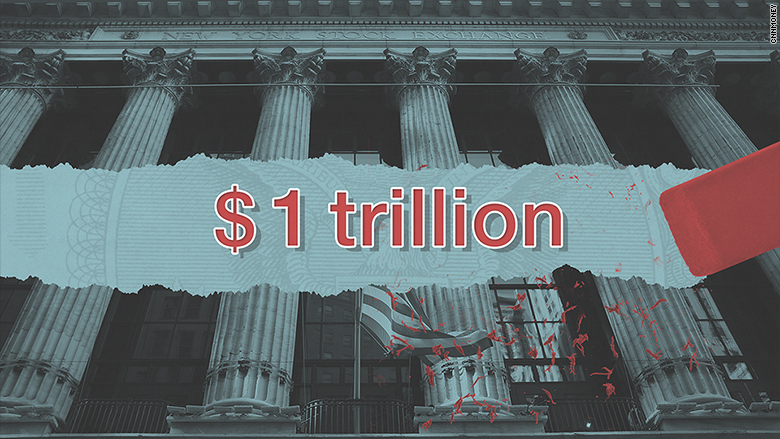
Wall Street's disastrous start to 2016 has caused roughly $1 trillion to vanish from the stock market.
The eye-popping losses highlight the deep fears that has gripped financial markets over China's economic slowdown and crashing oil prices.
That one-two punch caused the Dow and S&P 500 to suffer their worst start to a trading year on record last week.
The S&P 500's market valuation has plunged by $1.04 trillion since the end of 2015, according to S&P Dow Jones Indices.
To put that stunning figure in context, it's like wiping out the combined value of the following tech giants: Google (GOOGL) ($508 billion), Facebook (FB) ($281 billion), Intel (INTC) ($154 billion), Netflix (NFLX) ($50 billion) and Yahoo (YHOO) ($29 billion).
The Dow's market cap has plunged by $310 billion through Monday's close, according to S&P Dow Jones Indices. That's equivalent to ExxonMobil (XOM) ($309.5 billion) being erased from the index.
The Nasdaq, the star of 2015, is also off to a terrible start. It's down about 7% so far in 2016 and on Monday notched its eighth losing day in a row. That's the longest losing streak for the Nasdaq since 2008.
Small-cap stocks are getting rocked even more than their larger cousins. The Russell 2000 has already tumbled 7% this year and narrowly avoided closing on Monday in a bear market, which signals a 20% decline from previous highs.
No wonder there are lots of signs of rising fear on Wall Street. CNNMoney's Fear & Greed Index is now flashing "extreme fear," a dramatic reversal from "neutral" just two weeks ago.
Related: Nearly half of U.S. stocks are in a bear market
The good news is that U.S. stock markets have stabilized a bit this week as things in turbulent China have calmed a bit. The Dow notched a tiny gain on Monday and then jumped more than 100 points shortly after Tuesday's opening bell, although those gains quickly fizzled.
"The risk of a full-blown bear market remains low without a recession, which our economists see as unlikely," Bank of America Merrill Lynch U.S. equity strategist Savita Subramanian wrote in a client report.
However, Subramanian does think "some near-term caution is warranted until earnings growth improves."
That may take some time. Fourth-quarter earnings season, which unofficially starts this week, is expected to reveal the first back-to-back decline in corporate profits since 2009, according to S&P Capital IQ.
Cheap oil prices are a big driver of shrinking profits as well as the recent slump in the stock market. Eight of the nine worst performers in the S&P 500 have exposure to the energy market, led by Freeport-McMoRan (FCX) and Williams Companies (WMB), which have plummeted 44% and 34%, respectively just since the beginning of the year.
Related: Sell everything! UBS says 2016 will be a 'cataclysmic year'
It's not just oil stocks getting beaten up though. Well-known S&P 500 stocks already down more than 10% include AutoNation (AN), Wynn Resorts (WYNN), Under Armour (UA) and Chipotle (CMG).
In fact, less than 10% of the S&P 500 has gained ground this year. And some of the early winners don't paint a pretty picture. For example, the best Dow performer is Wal-Mart (WMT), which analysts say is likely benefitting from concerns that an economic slowdown in the U.S. will force consumers to pinch pennies.
Macy's (M) stock has soared 9% this year. But most of that positive response came after the retailer announced plans to cut thousands of jobs. That's hardly a vote of confidence in the future.
Still, some think the early 2016 market freakout has been overdone. After all, the U.S. economy continues to grow. Morgan Stanley thinks the recovery from the Great Recession could actually last until 2020, making it the largest expansion in post-World War II history.
"Last week's selloff reflected fear more than fundamentals," David Kelly, chief global strategist at JPMorgan Funds, wrote in a client note.
"In the long run fundamentals should prevail -- the trick for investors is to recognize this early enough and get invested appropriately before these fundamentals are once again priced in," he wrote.


